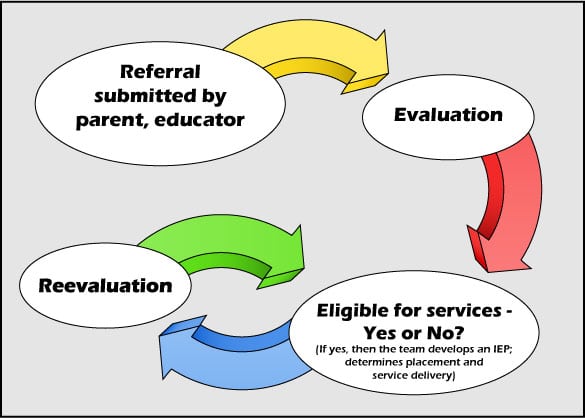Your cart is currently empty!
IEP Roadblocks? 10 Tips to Reach Your Goals
Doing poorly academically? Behavior problems? In danger of failing socially? Your child with ADHD may qualify for an IEP (Individualized Education Program).
Federal laws provide for services for students with disabilities in public schools. Students with ADHD can be eligible under Section 504 of the Rehabilitation Act and the Individuals with Disabilities Act (IDEA). The process is formal, with specific guidelines.
The story of receiving educational services often begins in the early grades. Parents, teachers, and the child are often aware of the challenges. In fact, children with ADHD receive informal accommodations from their teachers. Formal observations should be considered when there are little or no signs of improvement.
- Emotionally distraught over school.
- Limited social skills.
- Speech/language problems.
- Cognitive disorders.
- Working memory challenges.
Students with ADHD who have delayed skills might be eligible for special services as demonstrated by a formal process. While schools are often seen as the leaders, parents play even more crucial members of the education team. They should be armed with the necessary information to act as advocates for their child.
The Evaluation Process
IEP evaluations are not particularly complicated, but should be followed precisely. Tests are required for public schools and are used to determine eligibility. They are used to evaluate learning, whether special services are warranted. Additionally, they provide grounds for advocacy.
Requests for evaluation can either come from the school or the parents. Either must make a written petition. There are basically two outcomes. Yes, your child qualifies for assessment. Unfortunately, it can also be decided that nothing would be considered.
Parents should follow specific recourse, asking why the request for evaluation has been denied. Often times, they should seek support in moving forward.
- Ask specifically why they were refused to evaluate. Not just the list, the person as well.
- Schedule a formal meeting with the school. Make sure that several teachers attend too.
- Verify results through an independent educational evaluation (school not required to pay). Find someone specializing in ADHD.
- Talk to an advocate or lawyer to help navigate the process. Ask for details on what comes next.
- File a due process complaint listing documented reasons why their child needs services. Keep in mind that the parents have to burden of proof.
Determining Eligibility
The factors for determining special education eligibility are clear. The student must have a disability or disabilities. They must adversely affect educational performance. They must both be certain in order for the findings to support forward progress.
There are 13 categories of special education as defined by the Individuals with Disabilities Education Act (IDEA). In order to qualify for special education, the IEP team must determine that a child has one of the following:
- Autism
- Blindness
- Deafness
- Emotional Disturbance
- Hearing Impairment
- Intellectual Disability
- Multiple Disabilities
- Orthopedic Impairment
- Other Health Impaired
- Specific Learning Disability
- Speech or Language Impairment
- Traumatic Brain Injury
- Visual Impairment
The challenge is that ADHD is not specifically listed as a disability. However, students with ADHD have symptoms and challenges that speak to academic performance. Being steadfast is important in getting the educational accommodations that will lead to an improved learning environment.
Parents have the right to appeal results. Requests must be made in writing and be specific in nature. Likewise, the school must respond in written form. A hopeful dialogue will provide opportunities to resolve the dispute.
- Determine helpful people and resources. Make sure they’re current.
- Seek support and relief from family and friends. Hang around the positive ones.
- Evaluate reports for exact trouble spots. Use previous report cards too.
- Utilize targeted help (advocates, lawyers, school agencies). Get referrals.
- Think about how you know that you’re right. Be honest with yourself.
Although ADHD is not one of the 13 listed disabilities in IDEA, children with ADHD may be eligible on the basis of one of the specified conditions. This includes common comorbid conditions such as learning disabilities and developmental delays. The may also qualify under the “Other Health Impairment” category.
Children who qualify under IDEA are entitled to special education services. In contrast, Section 504 of the Rehabilitation Act is more focused on accommodations. Created by parents, teachers, and other staff, IEPs detail services provided, set annual goals, and determine how progress should be measured.
Stay informed. More forward with care.
Tags

EdieLovesMath empowers individuals with ADHD and Autism, their families, and professionals through a 4-step plan that builds confidence and success in reading, math, writing, and organization. As someone with a neurodiverse brain herself, Edie understands the challenges and triumphs of navigating learning differences firsthand. Join us. We’re here to guide your journey.
About Me ›
- Getting Disability Accommodations in College: What Students and Parents Need to Know
- Neurodivergent Burnout: How to Recognize It and Tips to Recover
- ADHD and Math Anxiety: How to Help Kids (and Adults!) Feel Confident with Numbers
- 5 Tips to Organize Your Workday If You Have Executive Functioning Disorder
- The 2025 Attack on Disability Rights: Why Section 504 Matters More Than Ever

Leave a Reply